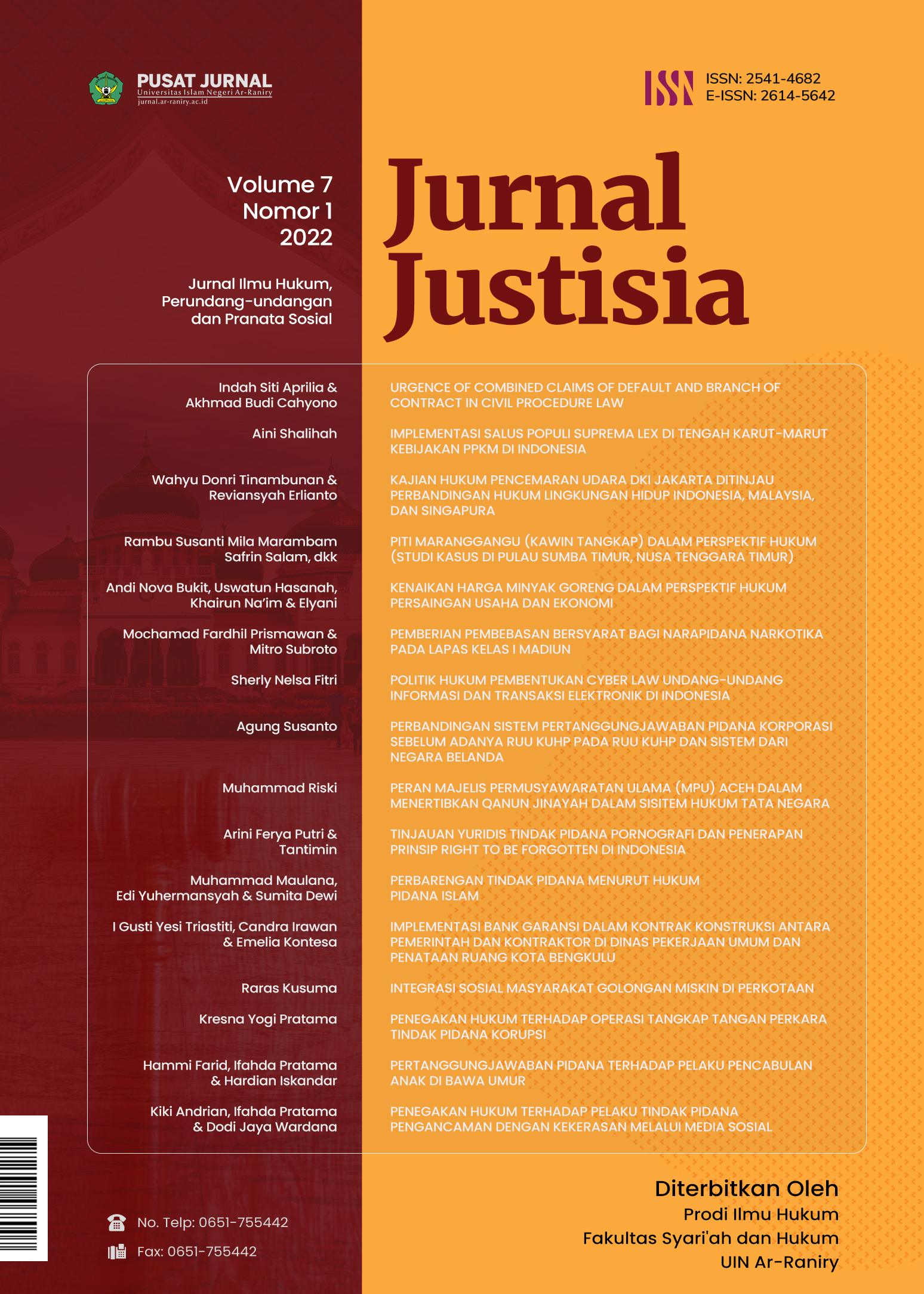Perbarengan Tindak Pidana Menurut Hukum Pidana Islam (Analisis Putusan Hakim Nomor 39/Pid.B/2019/Pn.Tdn)
DOI:
https://doi.org/10.22373/justisia.v7i1.12877Abstract
Concurrent criminal acts often occur in the community, even in the process many have been resolved in court, one of these cases is the Tanjungpandan District Court Decision Number 39/Pid.B/2019/PN.Tdn. In this decision, the perpetrator was charged with committing a crime concurrently between premeditated murder and theft in aggravating conditions. In this paper, the main issue raised is about how the judge's considerations in imposing sentences on the perpetrators and the review of Islamic criminal law against the concurrent criminal acts in the decision. This paper is presented with a literature study, with the type of normative legal research (juridical-normative). This paper concludes that the reasons and considerations of the judge in sentencing the perpetrators of the crime of premeditated murder and theft in Decision Number 39/Pid.B/2019/PN.Tdn include two criteria, namely the case of premeditated murder through Article 340 of the Criminal Code. In the review of Islamic criminal law, the concurrent crime of murder and theft is included in the theory of al-jabb, namely a punishment that can absorb other punishments, namely the death penalty.References
Adami Chazawi. Kejahatan Terhadap Tubuh & Nyawa. Jakarta: Rajawali Pers, 2011.
Ahmad Wardi Muslich. Pengantar & Asas Hukum Pidana Islam. Jakarta: Sinar Grafika, 2004.
Andi Sofyan, Nur Azisa. Hukum Pidana. Makassar: Pustaka Pena Press, 2016.
Duwi Handoko. Asas-Asas Hukum Pidana Dan Hukum Penitensier Di Indonesia. Pekanbaru: Hawa dan Ahwa, 2017.
Echwan Iriyanto, Halif. “Unsur Rencana Dalam Tindak Pidana Pembunuhan Berencana.” Yudisial 14 (2012): 33.
Fitrotin Jamilah. KUHP (Kitab Undang-Undang Hukum Pidana). Jakarta: dunia cerdas, 2014.
Hakim, Lukman. Asas-Asas Hukum Pidana. Edited by Deepublisher. Yogyakarta, 2020.
Jonaedi Effendi. Rekonstruksi Dasar Pertimbangan Hukum Hakim Berbasis Nilai-Nilai Hukum Dan Rasa Keadilan Yang Hidup Dalam Masyarakat. Jakarta: Kencana Prenada Media Group, 2018.
Manullang, E. Fernando M. Selayang Pandang Hukum Di Indonesia. Jakarta: Kencana Prenada Media Group, 2017.
Mardani. Hukum Pidana Islam. Jakarta: Kencana Prenada Media Group, 2019.
Monang Siahaan. Korupsi Penyakit Sosial Yang Mematikan. Jakarta: PT Gramedia Elex Media Komputindo, 2013.
Muhammad Fauzan & Badruddin Siagian. Kamus Hukum Dan Yurisprudensi. Jakarta: Kencana Prenada Media Group, 2017.
Nuraisyah. Pelaksanaan Hukuman Menurut Al-Qur’an, Dan Al-Sunnah. Yogyakarta: Bintang Pustaka Madani, 2020.
Romli Atmasasmita. Rekonstruksi Asas Tiada Pidana Tanpa Kesalahan. Jakarta: Gramedia Pustaka Utama, 2017.
Suyanto. Pengantar Hukum Pidana. Yogyakarta: Deepublish, 2018.
Zuleha. Dasar-Dasar Hukum Pidana. Yogyakarta: Deepublish Budi Utama, 2017.
Downloads
Additional Files
Published
Issue
Section
License
The Authors submitting a manuscript do so on the understanding that if accepted for publication, copyright of the article shall be assigned to Jurnal Justisia : Jurnal Ilmu Hukum, Perundang-undangan dan Pranata Sosial, Ar-Raniry State Islamic University, Indonesia as the publisher of the journal.
Jurnal Justisia : Jurnal Ilmu Hukum, Perundang-undangan dan Pranata Sosial right of first publication with the work simultaneously licensed under Creative Commons Attribution-ShareAlike 4.0 International License (CC BY-SA 4.0) that allows others to share (copy and redistribute the material in any medium or format) and adapt (remix, transform, and build upon the material) the work for any purpose, even commercially with an acknowledgment of the work's authorship and initial publication in Jurnal Justisia : Jurnal Ilmu Hukum, Perundang-undangan dan Pranata Sosial. Authors are able to enter into separate, additional contractual arrangements for the non-exclusive distribution of the journal's published version of the work (e.g., post it to an institutional repository or publish it in a book), with an acknowledgment of its initial publication in Jurnal Justisia : Jurnal Ilmu Hukum, Perundang-undangan dan Pranata Sosial. Authors are permitted and encouraged to post their work online (e.g., in institutional repositories or on their website) prior to and during the submission process, as it can lead to productive exchanges, as well as earlier and greater citation of published work (See The Effect of Open Access).

